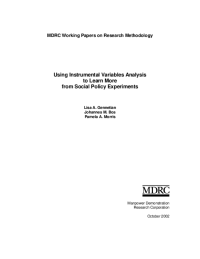Using Instrumental Variables Analysis to Learn More from Social Policy Experiments
One strategy for discovering the connections between social policy interventions and behavioral outcomes is to conduct social experiments that use random assignment research designs. Although random assignment experiments provide reliable estimates of the effects of a particular policy, they do not reveal how a policy brings about its effects. If policymakers had answers to the “how” questions, they could design more effective interventions and make more informed policy trade-offs. This paper reviews one promising approach to specifying the causal paths by which impacts are expected to occur: instrumental variables analysis, a method of estimating the effects of intervening variables — also called mediating variables, or mediators — that link interventions and outcomes. It explores the feasibility of applying this approach to data from random assignment designs, reviews the policy questions that can be answered using the approach, and outlines the conditions that have to be met for the effects of mediating variables to be estimated. Illustrations of instrumental variables analysis based on data from random assignment studies are also presented.






